BELIEF & PRACTICE . Kosher Certification
BOB ABERNETHY, anchor: In Israel, there is a new flap about what’s kosher — in this case, whether hummus, the popular chickpea spread, conforms to Jewish law as set forth in the Torah if the sesame seeds that are an ingredient have been shelled and roasted by non-Jews. An influential former chief rabbi says no. Other religious officials disagree.
In most cases, as in this country, the question is not who is preparing kosher food, but how it’s done, and that’s the subject for this week’s Belief and Practice. Kosher products in the U.S. are increasingly popular, which means busy days for the Union of Orthodox Jewish Congregations, the Orthodox Union in New York, the largest group inspecting and certifying kosher food preparation.
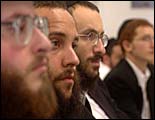 Every two years, rabbis and rabbinical students from around the world assemble in New York for a series of lectures on kosher food inspection.
Every two years, rabbis and rabbinical students from around the world assemble in New York for a series of lectures on kosher food inspection.
UNIDENTIFIED RABBI: But you must wear waterproof gloves so you don’t burn yourself.
ABERNETHY: It’s called “Ask OU,” for Orthodox Union. For some, it’s a supplement to their formal education. For others, it’s one part of training in becoming a “mashgiach,” the one who makes sure that kosher slaughterhouses, packing plants, factories, and hotel and restaurant kitchens are really kosher.
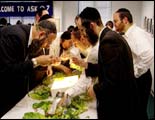 Rabbi YOSEF GROSSMAN (Director, “Ask OU,” Orthodox Union): So we feel that this opens their eyes, you know; it gives them an overview of what kosher’s all about.
Rabbi YOSEF GROSSMAN (Director, “Ask OU,” Orthodox Union): So we feel that this opens their eyes, you know; it gives them an overview of what kosher’s all about.
ABERNETHY: “Ask OU” was begun in 1996 and has grown along with the kosher food industry and the greater need for enforcers of kosher standards.
UNIDENTIFIED RABBI: Clean the whole inside, the top, everything, and then we’ll put Sternos® in the bottom.
ABERNETHY: The standards are strict and apply to every step of food preparation. If the inspectors find the facilities and methods and ingredients are all kosher, the final product gets a stamp of approval.
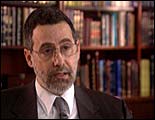 Rabbi MENACHEM GENACK (Rabbinic Administrator, Kashrut Division, Orthodox Union): The word “kosher” means “fit.” It means that the food has been prepared or meets the standards of kosher law, and those laws are first formulated in the Bible. Its purpose is spiritual more than physical.
Rabbi MENACHEM GENACK (Rabbinic Administrator, Kashrut Division, Orthodox Union): The word “kosher” means “fit.” It means that the food has been prepared or meets the standards of kosher law, and those laws are first formulated in the Bible. Its purpose is spiritual more than physical.
Rabbi TZVI HERSH WEINREB (Executive VP, Orthodox Union): It takes, kind of, the presence of God and puts it into three meals a day.
ABERNETHY: So what qualifies as kosher?
Rabbi GENACK (Rabbinic Administrator, Orthodox Union): In terms of animals — it has to be animals that have split hooves and chew their cud.
The Bible has a definition for fish as well. In order for it to be a kosher fish it has to have fins and scales. Shellfish and pork are never permitted.
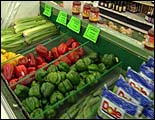 In order for an animal to be kosher, aside from that it has to be slaughtered in a particular way, which is essentially painless, consumption of blood is forbidden in the Torah, and that’s why kosher meat has to be salted, because the salting process extracts the blood from the meat.
In order for an animal to be kosher, aside from that it has to be slaughtered in a particular way, which is essentially painless, consumption of blood is forbidden in the Torah, and that’s why kosher meat has to be salted, because the salting process extracts the blood from the meat.
The Bible says — the Torah says that you cannot seethe a kid in its mother’s milk. One is forbidden actually to cook meat and milk together.
You’re not even allowed to eat them, you know, in the same meal, or in the same time frame.
Products that are neither dairy nor meat don’t follow these regulations [and] are called “pareve,” which means “neutral” in Yiddish. A pareve product can be eaten with either meat or dairy.
ABERNETHY: For a variety of reasons — religious, health, or just plain preference — there’s been an explosion in the demand for kosher products among Jews and non-Jews over the past decade.
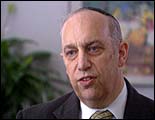 HARVEY BLITZ (Chairman of the Board, Orthodox Union): We now see a resurgence of interest in the study of Jewish texts. And so the breadth of the people who are interested, I think, in keeping kosher is expanding.
HARVEY BLITZ (Chairman of the Board, Orthodox Union): We now see a resurgence of interest in the study of Jewish texts. And so the breadth of the people who are interested, I think, in keeping kosher is expanding.
Rabbi MOSHE ELEFANT (Executive Rabbinic Coordinator, Orthodox Union): I have opportunity to meet a lot of people who want to be kosher-certified and are not necessarily Jewish or might never have known anything about kosher until they met me. And I many times give them a test. I tell them, “Why don’t you go home tonight and open up your pantry and see how many kosher products you have in your pantry and your refrigerator.” They call me back the next day and say, “Rabbi, I’m almost Jewish — everything in my pantry is already certified!”
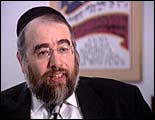 Here you have a program that in every product, in every package, every day, you have that kosher symbol. And the people who are looking for it are a loyal group so, in terms of a marketing opportunity, it’s incredible.
Here you have a program that in every product, in every package, every day, you have that kosher symbol. And the people who are looking for it are a loyal group so, in terms of a marketing opportunity, it’s incredible.
Companies call us and say, you know, “We went kosher and our sales skyrocketed.” Like they say, “Kosher is hot.”






